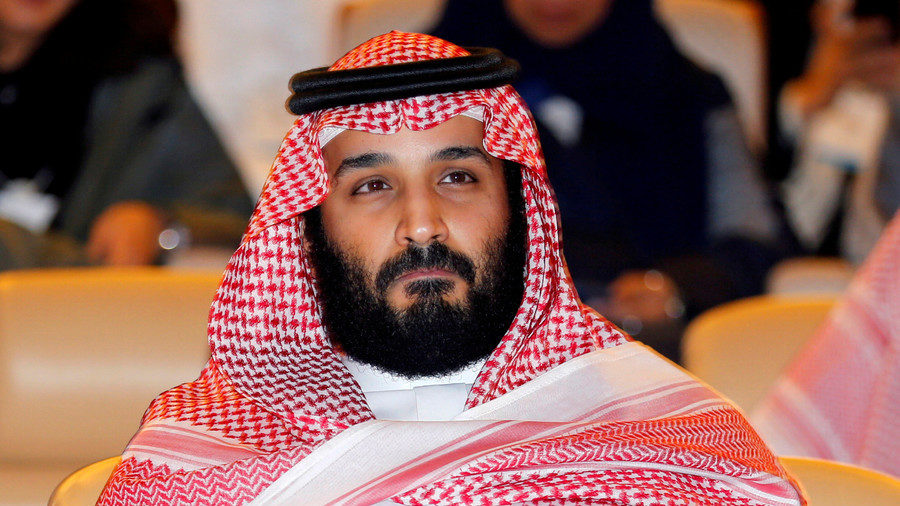Kommentar: En mindre korrektion: Wahabisme er nutidens jihadi terrorisme. Vestlige nationer, i særlig grad USA er derfor direkte ansvarlig for ALL sådan terrorisme i dag. Og det hele, fordi de er hysterisk motiveret til at "få Rusland". [Eng: "get Russia"; der er flere betydninger, herunder at irritere, provokere, få kontrol med, få ram på.]
I en samtale med avisen, sagde bin Salman, at Saud Arabiens vestlige allierede anmodede landet om at investere i moskeer og madrasser udenlands under den Kolde Krig i en bestræbelse på at forhindre Sovjetunionens indtrængen i muslimske lande.
Han sagde, at efterfølgende Saudi Arabiske regeringer havde mistet kontakten med initiativet, og sagde, at "vi er nødt til at få det hele tilbage". Bin Salman sagde også, at finansieringen for det meste kommer fra saudi-baserede "fonde", snarere end fra regeringen.
Kommentar: For det første lader det til, at der er nogen, der har et meget godt tag på finansieringen, træningen og bevæbningen af titusindvis af jihadis, der flytter ind i lande, hvor USA ønsker at "regimeændre". Så derfra og til at sige, at man har mistet kontrollen med jihadi træningslejre, (madrassaer) hvis ens "fonde" stadig financierer dem?
Vigtigheden af denne indrømmelse kan ikke overdrives. USA og dets NATO og Golfallierede er direkte og indirekte ansvarlige for ALT mere omfattende jihadi-terrorisme gennem de sidste 30 år, og det lader til, at de var motiveret til at opmuntre det pga. deres hysteriske had til Rusland.
Kommentar: Delvist oversat af Sott.net fra Saudi prince MBS: 'Anglo-Americans asked us to spread Extremist Islam to defeat Russia in Cold War'
Se også en artikel i den tyrkiske Daily Sabah, der efter sigende står regeringen nær: Cold War-era Wahhabism used as tool against Soviets on US demand, Saudi Crown Prince Salman confesses
Cold War-era Wahhabism used as tool against Soviets on US demand, Saudi Crown Prince Salman confesses
Saudi Crown Prince Mohammed Bin Salman made a historic confession about Wahhabism in a recent interview with The Washington Post's Karen DeYoung.
In the piece published on March 22, the crown prince said that Wahhabism, widely accused of being the sole source of global terrorism, was used as a tool against Soviets during the Cold War era, and the Saudi-funded expansion of the sect was done on the demand of the United States.
Investments in Wahhabi-linked mosques and madrassas overseas "were rooted in the Cold War, when allies asked Saudi Arabia to use its resources to prevent inroads in Muslim countries by the Soviet Union," he said.
According to Salman, later Saudi governments "lost track of the effort," and now "we have to get it all back."
Salman added that, nowadays funding comes largely from Saudi-based "foundations," not from the government.
[... avisen forklarer efterfølgende deres syn på hvad wahabisme er ...]
The crown prince's 75-minute interview with the Washington Post took place on March 22, the final day of his US tour. Another topic of discussion included a previous claim by US media that bin Salman had said that he had White House senior adviser Jared Kushner "in his pocket."
Bin Salman denied reports that when he and Kushner - who is also Donald Trump's son-in-law - met in Riyadh in October, he had sought or received a greenlight from Kushner for the massive crackdown on alleged corruption which led to widespread arrests in the kingdom shortly afterwards. According to bin Salman, the arrests were a domestic issue and had been in the works for years.
He said it would be "really insane" for him to trade classified information with Kushner, or to try to use him to advance Saudi interests within the Trump administration. He stated that their relationship was within a normal governmental context, but did acknowledge that he and Kushner "work together as friends, more than partners." He stated that he also had good relationships with Vice President Mike Pence and others within the White House.
The crown prince also spoke about the war in Yemen, where a Saudi-led coalition continues to launch a bombing campaign against Houthi rebels in an attempt to reinstate ousted Abdrabbuh Mansur Hadi as president. The conflict has killed thousands, displaced many more, driven the country to the brink of famine, and led to a major cholera outbreak.
Comment: The prince is quite the liberal reformer: UN humanitarian coordinator "shocked" by Saudi atrocities in Yemen
Although the coalition has been accused of a large number of civilian deaths and disregard for civilian lives - an accusation which Riyadh denies - the crown prince said his country has not passed up "any opportunity" to improve the humanitarian situation in the country. "There are not good options and bad options. The options are between bad and worse," he said.
The interview with the crown prince was initially held off the record. However, the Saudi embassy later agreed to led the Washington Post publish specific portions of the meeting.




Kommentar: Saudi Arabia wouldn't exist as it does today without the West, and his claims are well documented:
- You can't understand ISIS if you don't know the history of Wahhabism in Saudi Arabia
- Saudi Arabia tops the list for foreign financial support of Wahhabi British terrorists, Theresa May is keeping a lid on it
- Beyond Islamophobia: The Truth About Salafism and Jihadism
- London terror attacks: Why we need to talk about Saudi Arabia and Wahhabism
- Saudi Arabia: A rogue state with never ending history of human rights violations
Also check out SOTT radio's: Behind the Headlines: MBS Saudi Takeover Heralds End of the Petrodollar? Trump Does Asia, Asia Likes It